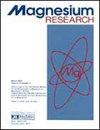Hypomagnesemia in adults of northern Serbia: prevalence, nutritional risk factors, and associated comorbidities.
IF 1
4区 医学
Q4 BIOCHEMISTRY & MOLECULAR BIOLOGY
引用次数: 3
Abstract
INTRODUCTION Magnesium (Mg) deficiency is associated with numerous non-communicable diseases. The aim of the study was to estimate the prevalence of hypomagnesemia in the general adult population of Northern Serbia (NS), and to determine the level of Mg in drinking water. METHODS This is a cross-sectional study with 5,122 adults from the general population. Serum level of Mg was determined by spectrophotometry, while the level of Mg in the drinking water was done by atomic absorption spectrophotometry. Standard laboratory methods were used to determine individual's blood lipid status and complete blood count. RESULTS The prevalence of hypomagnesemia (Mg < 0.75 mmol/L) in the general population was 2.7%, while the prevalence of the subjects with high risk for the Mg deficiency (Mg 0.75-0.85 mmol/L) was 20.1%. The public water supply showed variable values between 17.3-35.3 mg/L. Age, systolic blood pressure, duration of diabetes mellitus, and glycemia increase with the decrease of Mg level. In addition, increased level of Mg was associated with higher red blood cell count and hemoglobin levels. CONCLUSIONS The prevalence of hypomagnesemia in Northern Serbia is low (2.7%) and level of Mg in drinking water is not satisfactory. Serum level of Mg in the range 0.75-0.85 mmol/L is present in about 1/5 of the population. Glycemia, advanced age, gender, and smoking have a predictive role in hypomagnesemia occurrence. There is a significant correlation between serum level of Mg and lifestyle and dietary habits.塞尔维亚北部成人低镁血症:患病率、营养危险因素和相关合并症
镁(Mg)缺乏与许多非传染性疾病有关。本研究的目的是估计北塞尔维亚(NS)普通成年人低镁血症的患病率,并确定饮用水中的镁水平。方法:这是一项横断面研究,来自普通人群的5122名成年人。采用分光光度法测定血清Mg含量,原子吸收分光光度法测定饮水中Mg含量。采用标准实验室方法测定个体血脂状态和全血细胞计数。结果普通人群低镁血症(Mg < 0.75 mmol/L)患病率为2.7%,缺镁高危人群(Mg 0.75 ~ 0.85 mmol/L)患病率为20.1%。公共供水在17.3-35.3 mg/L之间变化。年龄、收缩压、糖尿病病程、血糖随Mg水平的降低而升高。此外,Mg水平升高与红细胞计数和血红蛋白水平升高有关。结论塞尔维亚北部地区低镁血症患病率较低(2.7%),饮用水中Mg含量不理想。约1/5的人群血清Mg水平在0.75-0.85 mmol/L之间。血糖、高龄、性别和吸烟对低镁血症的发生有预测作用。血清Mg水平与生活方式、饮食习惯有显著相关性。
本文章由计算机程序翻译,如有差异,请以英文原文为准。
求助全文
约1分钟内获得全文
求助全文
来源期刊

Magnesium research
医学-内分泌学与代谢
CiteScore
3.50
自引率
9.40%
发文量
6
审稿时长
>12 weeks
期刊介绍:
Magnesium Research, the official journal of the international Society for the Development of Research on Magnesium (SDRM), has been the benchmark journal on the use of magnesium in biomedicine for more than 30 years.
This quarterly publication provides regular updates on multinational and multidisciplinary research into magnesium, bringing together original experimental and clinical articles, correspondence, Letters to the Editor, comments on latest news, general features, summaries of relevant articles from other journals, and reports and statements from national and international conferences and symposiums.
Indexed in the leading medical databases, Magnesium Research is an essential journal for specialists and general practitioners, for basic and clinical researchers, for practising doctors and academics.
 求助内容:
求助内容: 应助结果提醒方式:
应助结果提醒方式:


